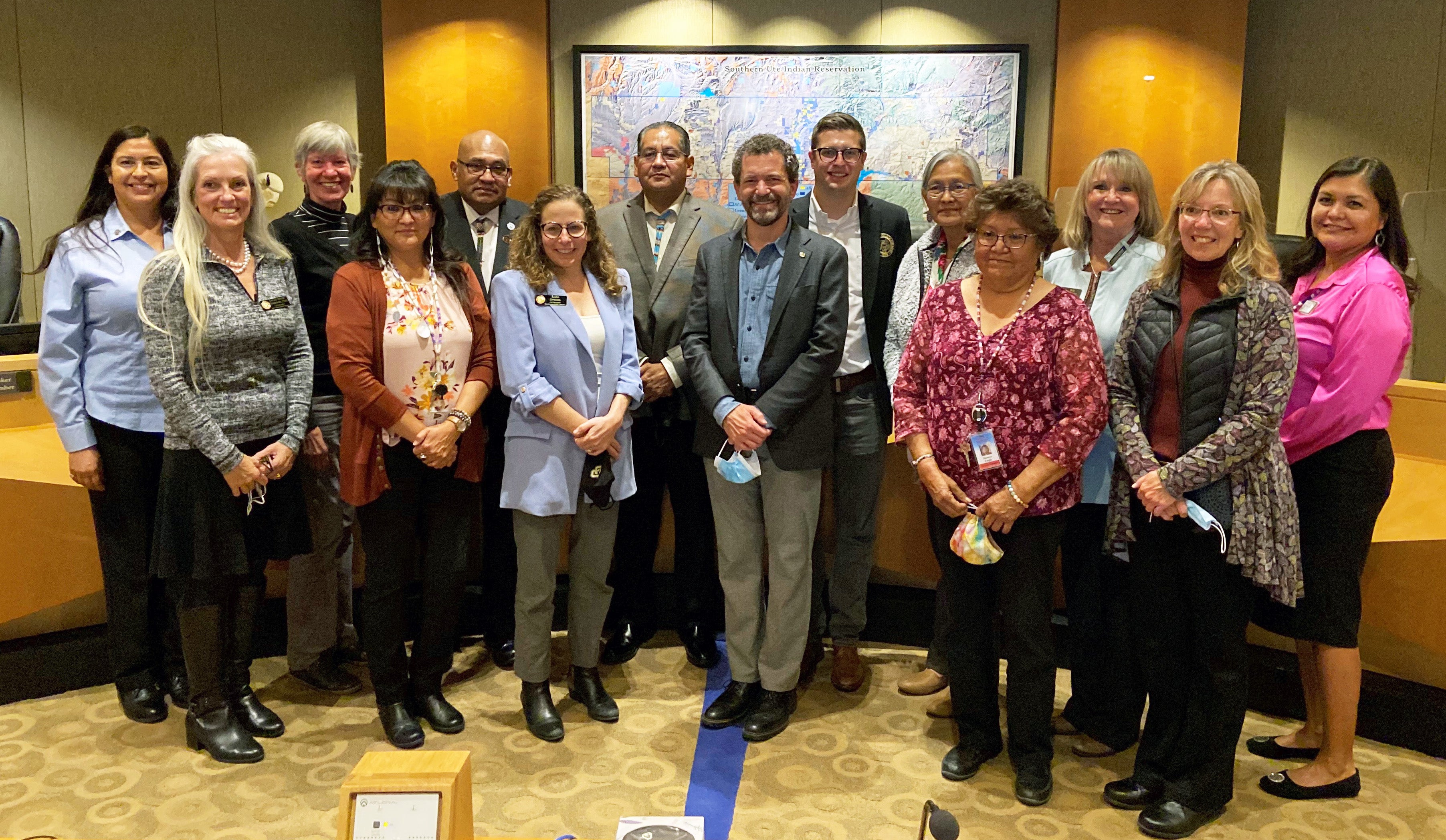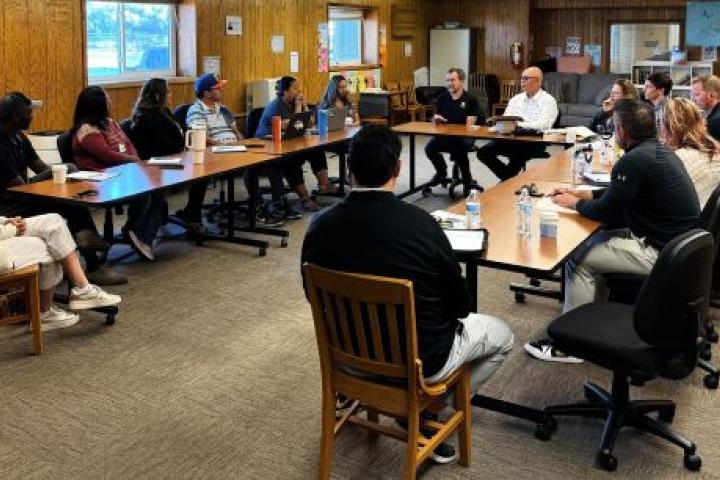Issue
November 2021
CU is Colorado’s University
Outreach to communities statewide helps us better serve Colorado. One way we’re ensuring we achieve this is by traveling the state and meeting with members of Colorado’s many different communities.
Image

As the state’s largest university system, CU has a responsibility to be Colorado’s university. This means serving communities and people throughout Colorado and beyond. One way we’re ensuring we achieve this is by traveling the state and meeting with members of Colorado’s many different communities. Our outreach allows us to share information, hear how we’re doing and discuss ways we can improve to better serve our great state.
I’ve had the pleasure of visiting several communities across Colorado this fall with members of the Board of Regents to meet directly with stakeholders. Our outreach has included trips to Fort Morgan, Sterling, Pueblo and, most recently, Durango and Ignacio. We’re planning more trips around the state in the spring.
As we keep a close eye on the pandemic and public health, it’s a joy to meet with people face to face and hear what they want and need from CU. But talking is just the beginning. The real work happens afterward.
In our meetings with community leaders, school district representatives, business community members, lawmakers and tribal leaders, we’re reminded that Colorado is a big, beautiful, diverse state. Coloradans are as different as our landscapes, but we share a love of our state and hope for the future. The people we’ve met during our outreach agree that the CU system is an extraordinary resource and partner. That said, while we strive to ensure everyone feels welcome and included on our campuses, we’ve heard from some that we must do better. We recognize this and are taking steps to improve.
Most people we’ve met understand the importance of higher education in terms of raising the standard of living and quality of life. Unfortunately, quite a few also question the value of a four-year degree and tell us many people in their communities don’t envision themselves attending college and earning a degree. This should concern all of us because graduates with four-year degrees are critical for our state’s long-term economic health.
That’s not to say a four-year degree is right for everyone. But Colorado hasn’t done well when it comes to educating our own. And the comments we’re hearing show that while demand for our graduates is increasing, skepticism about the value of a four-year degree is also rising. This is clearly a call to action.
As Colorado’s university, we must do a better job of showing people who we are – and who we can be to them. People know CU Boulder is Colorado’s flagship campus and that CU Anschutz provides some of the best medical education and clinical care in the nation. CU Denver and UCCS are also outstanding campuses. Each offers valuable opportunities in very different environments and locations. When we talk about CU, we must be clear that we’re talking about all four campuses. And thanks to innovative collaborations with other Colorado institutions, CU’s presence continues to expand to other regions of the state.
During our most recent trip to Southwest Colorado, we met with several CU Fellows – CU Boulder postdoctoral students teaching at Fort Lewis College (FLC) as part of the CU@FLC program. The partnership enables recent CU Boulder PhD recipients to gain valuable experience in the classrooms at Colorado’s leading Native American degree-granting institution while also showing FLC students faculty who look like them. That goes a long way in giving the next generation the confidence to think big about their lives and their futures.
To help Coloradans from all areas, backgrounds and experiences understand that a college education is for them, we must reach K-12 students early on in their educational journeys. We already serve nearly 700 middle school and 2,000 high school students each year via precollegiate programs on our campuses. K-12 programs, summer camps and bridge programs, CU student mentors, concurrent enrollment and other forms of academic outreach, preparation and support – particularly in rural and underrepresented communities – make the prospect of earning a CU degree viable and accessible to more people.
We’re committed to ensuring that our campuses are places where all people feel a sense of belonging and an ability to thrive. Diversity, inclusion, equity, free speech and access are top priorities that are reflected in our systemwide strategic plan, and we’ve set specific metrics and goals in these areas. We’re also conducting a survey to help guide our work to make our campuses more welcoming to diverse people and ideas. In related news, I’m incredibly proud our CU Denver and CU Anschutz campuses recently achieved the federal Hispanic-Serving Institution (HSI) designation. This will open new avenues for federal funding to further our educational and research missions.
Being Colorado’s university means showing up and following up. We’re working our way through a healthy list of to-dos resulting from our outreach and we’re embracing the work. It will make us better and stronger – as a partner, resource, presence and university – for all of Colorado.

Todd Saliman
President, University of Colorado
CU News
University of Colorado Denver | Anschutz Medical Campus Recognized as Hispanic-Serving Institution
The University of Colorado Denver | Anschutz Medical Campus has become the first research university in the state to attain an Hispanic-Serving Institution designation by the U.S. Department of Education. To qualify, a university must have undergraduate full-time enrollment comprising at least 25% Hispanic students and demonstrate a high concentration of students who are eligible for Pell Grants.
CU Draws $1.45 Billion in Sponsored Research Funding
University of Colorado faculty this year attracted $1.45 billion in sponsored research funding and gifts fueling discovery and impact that benefit Colorado and beyond. The 2020-21 systemwide total marks the fifth consecutive year CU’s annual sponsored research funding and gifts have topped $1 billion.
Board of Regents Approves Compensation Increases
The CU Board of Regents voted unanimously to approve compensation increases for eligible faculty and non-classified university staff at CU Boulder, CU Denver, UCCS and system administration at its Nov. 5 meeting. The action follows regent approval of an increased compensation pool for CU Anschutz employees and classified staff systemwide that was effective July 1, 2021.
CU on the Air Podcast
CU Continues Long History of Honoring, Serving Veterans
For more than a century, CU has served veterans, as well as their families, and helped them reach their educational goals. Through community and student mentorships, new veteran centers, extensive campus services for vets and their families, and mental health guidance, CU is there for the veteran and military communities.
RECCS Pairs Community College Students with CIRES Scientists
The Research Experience for Community College Students summer internship program at CU Boulder is open to all Colorado community college students. RECCS gives these students an authentic research experience that allows them to explore environmental sciences or geosciences and gain confidence to transition to a four-year program in the STEM disciplines.
News from our campuses
CU Boulder
The Science Everyone Needs to Know about Climate Change, in Six Charts: Take a closer look at what’s driving climate change and how scientists know CO2 is involved via a series of charts examining the evidence in different ways.
UCCS
$3 Million UCCS Grant to Address Childhood Trauma Curriculum for Psychology Providers: The Lyda Hill Institute for Human Resilience, partnering with Dr. Christopher M. Layne, has received a $3 million grant from the Substance Abuse and Mental Health Administration to improve trauma education.
CU Denver
Engineering, Design and Computing Building Will Serve as Anchor for Innovation District: The creation of an open innovation district that will cultivate new technology, partnerships and programming, diverse talent, and in-demand jobs is part of CU Denver’s visionary 2030 strategic plan.
CU Anschutz
New CU School of Pharmacy Center Sets Path toward Drug Discovery Hub: A new CU School of Pharmacy Drug Discovery Center brings one-of-a-kind technology to the Rocky Mountain region that could turn the campus into a hub for breakthrough drug therapies.



